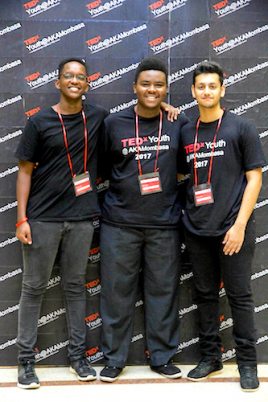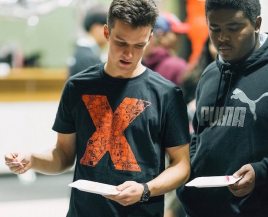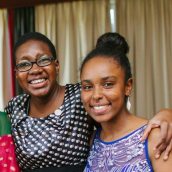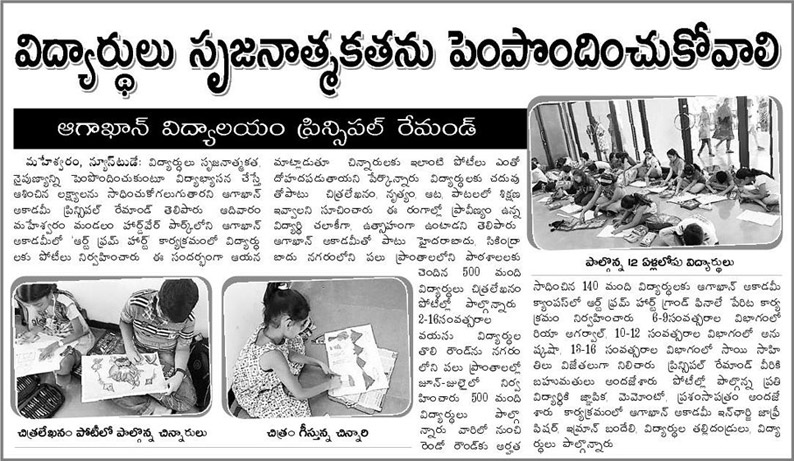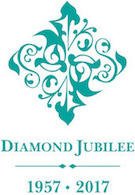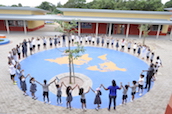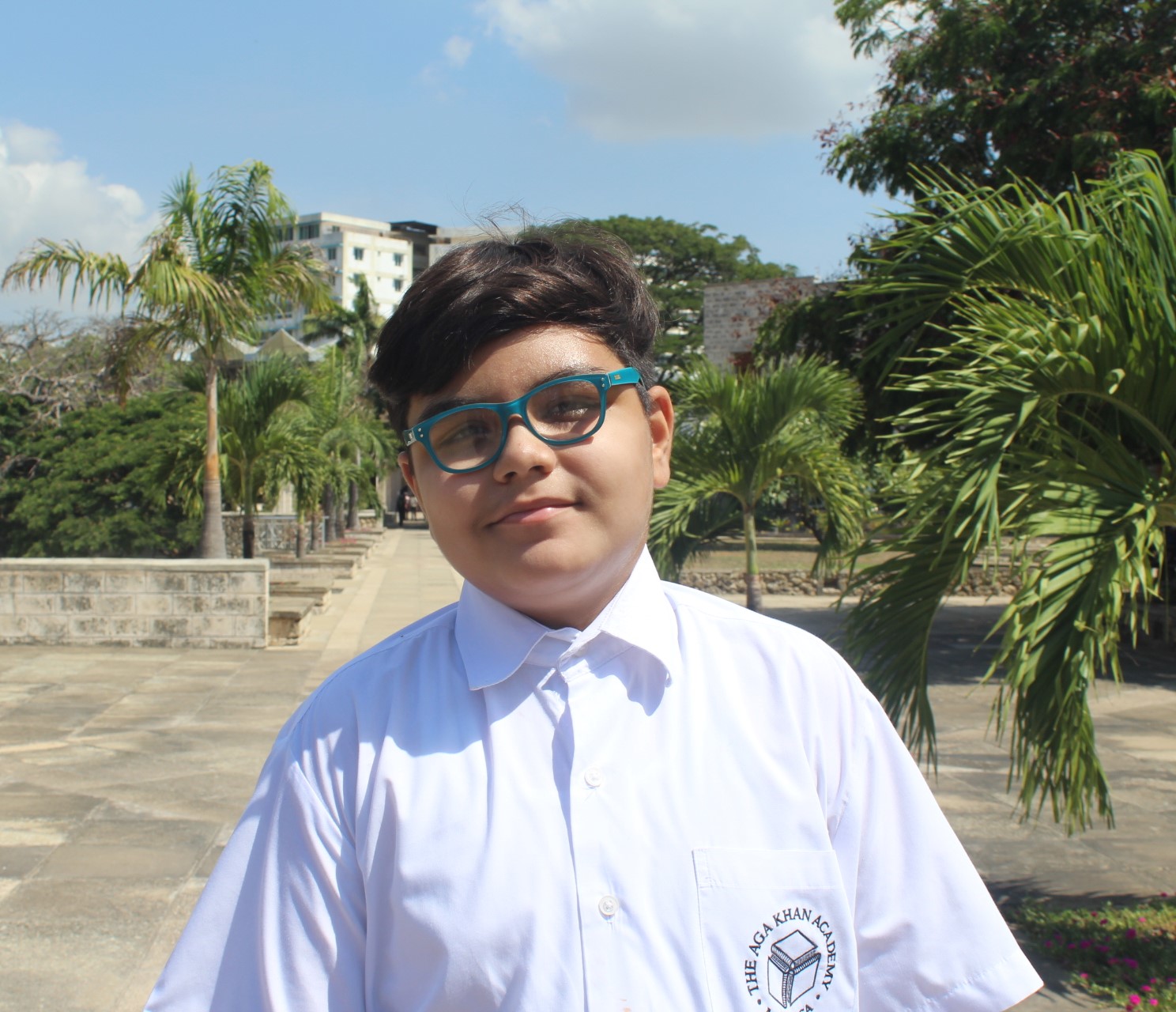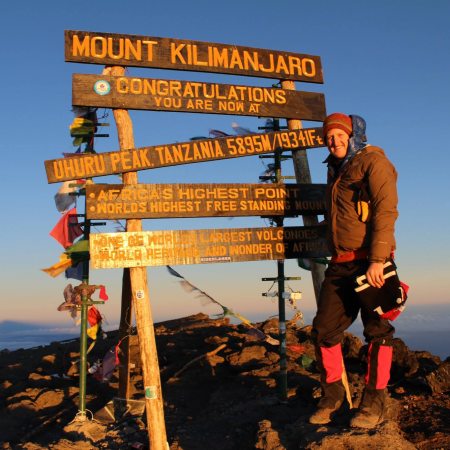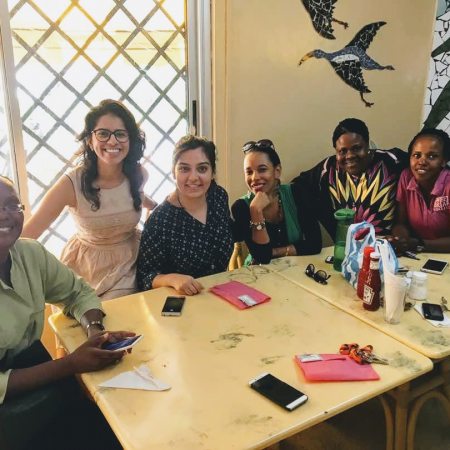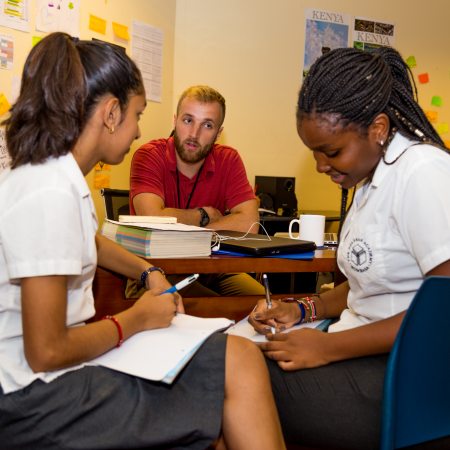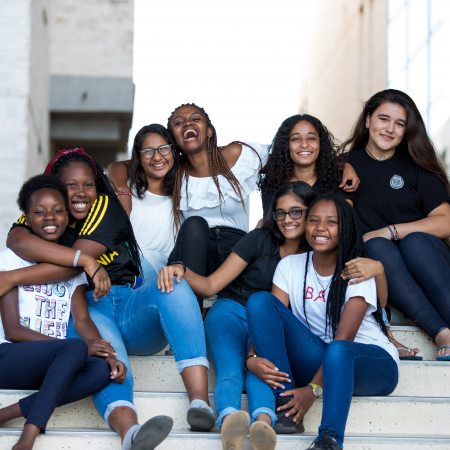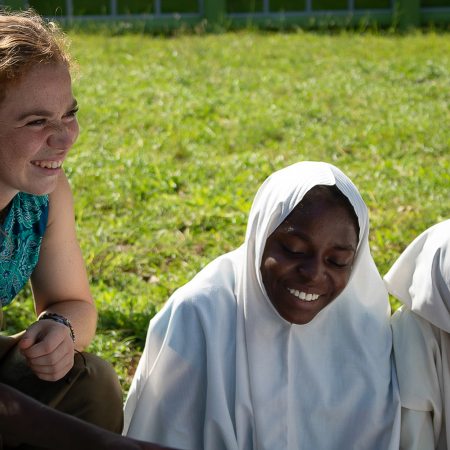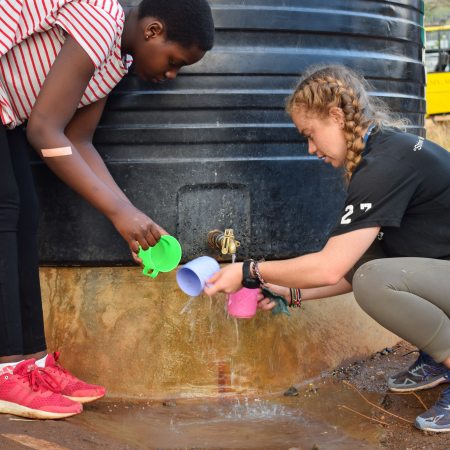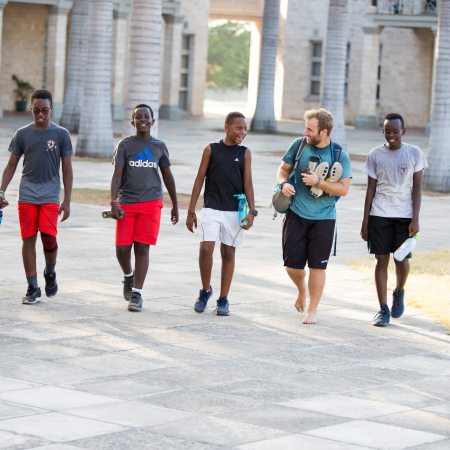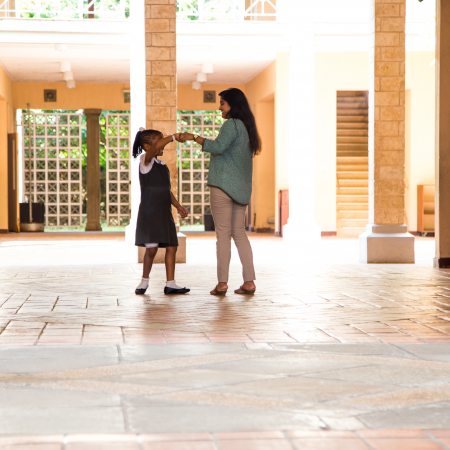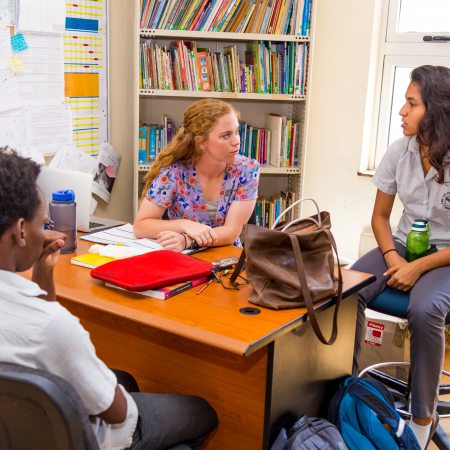Muriuki Njonjo (Class of 2017): Giving back through leadership and empathy
My goal in life has always been to be the very best version of myself that I can be. From the time I joined the Aga Khan Academy Mombasa for my International Baccalaureate (IB) Diploma Programme to when I graduated, that was the greatest period of personal growth in my life. The Academy changed my way of thinking, my way of doing things and informed my purpose in life.
Through a strong emphasis on the intrinsic value of education, the Academy had a lasting impact on me. I remember fondly living in residences which undoubtedly prepared me for living away from home in university. Residential life helped form bonds of friendship that I can confidently say will last a lifetime. The wisdom of dorm parents like Mr. Dudi and Mr. Prashant always helped me get through the rough tides of the IB Diploma Programme, and their words are still very much applicable to my daily life today.
In many ways, the Academy added great intrinsic value to me. However, there was more to that. The Academy demands of all its students a contribution. We lived in a space where we all felt we had to bring something to the table to the benefit of the larger community. It was in this sense of collective responsibility that I found my niche as an active member of the AKA Mombasa community. I was privileged to serve the Student Council as Secretary of the Finance Committee, a role that made me a steward of the student body’s finances. Alongside my committee, I approved the allocation of roughly US$1000 towards various service projects organised by students which had an impact on the local Mombasa community. The importance of giving back and empowering the less fortunate is built into the very fabric of the Academy’s mission and that helped me develop a profound sense of empathy.
I had the opportunity to establish a service club known as the Leo Club with the help of the local Lions Club. We went ahead to raise money for corneal transplants. With the help of my mentors Adnan and Aalia Visram, I co-founded the Academy’s first ever TEDxYouth event with my friend Preyansh Kaushik. Through TEDx we provided an incredible platform for members of our AKA Mombasa community to share their unique perspectives with millions of people across the world. TEDxYouth@AKAMombasa remains one of my proudest achievements at the Academy. Alongside my friend Inaara Savani and the constant guidance and support of Ms Alex Holland, I organised a workshop for Year 9 students on the Syrian refugee crisis. This opportunity eventually led me to Uganda in the Summer of 2016, where I volunteered as an English teacher at the Kyangwali Refugee Settlement. I was also honoured to be the Finance Executive of the CanCare club which organises the Academy’s annual blood drive. All these incredible opportunities have taught me valuable skills and have made me a driven person. Of course, all this would not have been possible without the support of my peers and faculty members.
One cannot speak about their time at the Academy without mentioning the rigorous academics geared towards creating critical, analytical and reflective thinkers. It’s through Mr. Vlad’s classes that I discovered my passion for politics because of the power it has to effect change in everyone’s lives. The strength of the curriculum and the way the teachers delivered it definitely prepared me for university workload. This combined with the numerous opportunities to get involved afforded to me ultimately won me a full scholarship to the University of Waterloo in Canada where I am currently majoring in political science and financial economics with Honours.
I still carry the spirit of AKA Mombasa with me. Since joining Waterloo, I have been involved in the organisation of the annual TEDx event, I have delivered a start-up pitch for funding at Velocity, the world’s largest free business incubator, and I have been privileged to join the first incorporated blockchain community management firm in North America as the Head of Public Relations. For now, I will continue to do what the Academy taught me to do best: contribute to my community and live out my potential in my truest self. In future I hope to go back home to Kenya and use my education and skills to help make a difference in people’s lives. Until then, I continue to live in a permanent space of gratitude for the person I am today, which I owe to the Aga Khan Academy Mombasa.Erica Byenkya (Class of 2014): Contributing to society with love and generosity
Erica Byenkya, who is a fourth-year student at Saint Mary’s University in Halifax, Canada, is a graduate of the Aga Khan Academy Mombasa and originally from Uganda. Since leaving the Academy in 2014, Erica has been pursuing a Bachelor of Commerce at the university with a double major in marketing and computer and information systems. She is expecting to graduate from the university in May 2019.
“I think that my Academy experience was vital in my success in university so far,” Erica says confidently.
The Academy, she says, nurtured within her a love of volunteering that helped her make connections and friends and ensured she remained connected to her local community.
“I think that we were definitely more focused on encouraging independence and community service than the schools attended by other students,” Erica comments.
The experience of living in residence at the Academy, she says, also helped her become more self-sufficient and taught her how to take care of herself – this was useful when she moved to Canada for higher education.
At university, Erica has worked through three work terms as part of the cooperative education programme. In these three terms, she has worked as a marketing coordinator for a software development company and at a non-profit organisation focused on encouraging students and faculty in the sciences. She has also taken up volunteer work, including with a local after-school youth programme and as the public relations representative of the Saint Mary’s African Student Society (SMASS). She is currently preparing for her second year with SMASS.
Erica is also doing well in her academic work. She received an entrance scholarship from Saint Mary’s University, which was increased last year due to academic achievement. Erica thanks her counsellors at the Academy in Mombasa for supporting her with her applications.
“I had a very hard time writing my personal statements for my university applications and I know that without the help of my counsellors, I would not have been accepted into all the universities I applied to.”
At the Academy, Erica was one of the founders of a service group that aimed to support local farmers in the area by consulting with them about their families’ needs and fundraising to help meet those needs. Through their efforts in the first year, they helped one family send their youngest children to school, build a small shop to sell their wares and buy new seeds. The service group also helped pay the exam fees of the entire graduating class of a local school so they could all sit their final exams.One of the many things Erica misses at the Academy in Mombasa is her wonderful friends.
“I am still in contact with some of them online but being able to spend so much time with them was a gift I am very thankful for,” she says.
Her most unforgettable experience at the Academy, which she is very proud of, was learning to play the violin; this, to her, was the most difficult to learn among other musical instruments. She fondly remembers her teachers: Mrs Mwandawiro, her dorm mother and chemistry teacher, and Mr Dudi, whom she calls, “my wonderfully dramatic English teacher.”
“They both pushed me very hard because they had high expectations for me, and while I did not perform as well as I hoped in chemistry, their expectations always encouraged me,” she says.
Erica chose to participate in the International Baccalaureate (IB) programme because she felt, and still feels, it offered her greater flexibility in her choices for the future.
“With the national curriculum, you are restricted to three subjects in your final two years," she says. "But I was unsure about the career path I wanted to take, so I really appreciated being able to further study interesting subjects in the IB programme while deciding what I wanted to do with my future."
Erica says her plans after graduating from university are to stay and work in Canada for a while and then eventually make the decision about whether to pursue a postgraduate degree.
“I do see myself coming back to Uganda, but before that happens I would like to travel more.”
When asked what she would focus on to improve the lives of people in her country if she had all the resources at her disposal, Erica hoped that one day she could contribute to the renovation of the Ugandan library system. She believes this would benefit all the citizens of Uganda, especially the young students whose schools may not have large libraries or who seek safe and productive spaces to spend their free time.
Students improve their Creativity
Students empowered with creativity and skills can achieve their goals, contended Mr Raymond, Principal, the Aga Khan Academy. On Sunday, the Aga Khan Academy Hyderabad, located in Maheswaram Mandalam, Hardware Park, organised a competition for students called Art from Heart. On this occasion, Mr Raymond claimed that such competitions will help students in developing creativity. He also advised that students need to be trained in activities like drawing, music, sports, dance and so on, along with studies. These skills make students active and enthusiastic learners.
About 500 students from various schools in Secunderabad and Hyderabad had participated in the preliminary rounds which were conducted in the months of June and July. The age group targeted was between 2 to16 years.
Out of 500 participants, 140 students qualified for the next round. These students took part in the grand finale event of Art from Heart, organised on the campus of the Aga Khan Academy Hyderabad.
Rhea Agarwal in 6-9 years age group, Anushka Shaw in 10-12 years age group and Sai Sahiti in 13-16 years age group were the winners. The prizes were given away by the Principal, Mr Raymond. Each participant received a trophy, a memento and a certificate. In this event, the head of the the Aga Khan Academy Hyderabad, Dr Geoffery Fisher, Imran Bandeali, students and parents took part.
Read the original article:
Welcome to your new Acquia Drupal website!
If you are new to Drupal, follow these steps to set up your web site in minutes:
Step 1. Start at the beginning
Visit the administration section for a task-based or module-based overview of the options available to configure your website.
Step 2. Connect to the Acquia Network
At any time you can activate an Acquia Network subscription to gain access to Acquia's timely, professional support, automated services such as Mollom spam blocking, Acquia Library and documentation. Acquia offers subscription levels for every size web site - from individual blogs to enterprise-scale, multi-site deployments. Once you have your Acquia Network subscription keys, enter them on the settings page. Get started with a free trial today.
Step 3. Activate functionality
Turn on added functionality for your site - blogs, forums, polls, tags, comments, and more. Acquia Drupal comes with important modules to power social publishing capabilities on your site.
Hundreds of additional Drupal 7.x compatible modules are available on Drupal.org in the Drupal modules download section, which you can install through your modules page.
Step 4. Start publishing content
Start creating content for your site. Depending on which modules you have activated, you may see blogs, forums, polls and more as available content types.
Some optional configuration tasks are shown below. For more information, please refer to the built-in help section, or the online Drupal handbooks.
Choose a different design
Start by changing the colors of the default theme. To change the fundamental "look and feel" of your website, visit the appearance section and choose a theme from one of the many themes available out-of-the-box.
Many additional Drupal 7.x compatible themes are available on Drupal.org in the Drupal themes download section, which you can install through your themes page.
Configure the front page
The default front page is a listing of all content marked as Promoted to front page
. You can manage your content from the content administration page. You can also designate, for example, an item of content you have created as the front page. See the site information settings page to configure the default front page path. You can also edit you site name and add a slogan to make the site your own.

60 Stories for 60 Years
To meet these inspiring individuals, check here for a new story each week during the Jubilee year. On social media, you can like us on Facebook and follow us on Twitter @AKAcademies.
|
Alumna, Aga Khan Academy Mombasa |
Students, Aga Khan Academy Mombasa |
|
Alumna, Aga Khan Academy Hyderabad |
Teacher, Aga Khan Academy Hyderabad |
|
Student, Aga Khan Academy Maputo |
Staff, Aga Khan Academy Network |
|
Alumnus, Aga Khan Academy |
Student, Aga Khan Academy Hyderabad |
|
Teacher, Aga Khan Academy Hyderabad |
Student, Aga Khan Academy Mombasa |
|
Student, Aga Khan Academy Mombasa |
Alumna, Aga Khan Academy Mombasa |
|
Alumna, Aga Khan Academy Mombasa |
Alumnus, Aga Khan Academy Hyderabad |
|
Alumna, Aga Khan Academy Hyderabad |
Alumna, Aga Khan Academy Mombasa |
|
Student, Aga Khan Academy Hyderabad |
Alumnus, Aga Khan Academy Mombasa |
|
Student, Aga Khan Academy Hyderabad |
Teacher, Aga Khan Academy Maputo |
|
Alumna, Aga Khan Academy Hyderabad |
Student, Aga Khan Academy Mombasa |
|
Student, Aga Khan Academy Mombasa |
Staff, Aga Khan Academy Hyderabad |
|
Student, Aga Khan Academy Mombasa |
Teacher, Aga Khan Academy Maputo |
|
Student, Aga Khan Academy Mombasa |
Teacher, Aga Khan Academy Maputo |
|
Teacher, Aga Khan Academy Mombasa |
Alumnus, Aga Khan Academy Hyderabad |
|
Teacher, Aga Khan Academy Maputo |
Student, Aga Khan Academy Hyderabad |
|
Student, Aga Khan Academy Mombasa |
Staff, Aga Khan Academy Hyderabad
|
|
Alumnus, Aga Khan Academy Mombasa
|
Staff, Aga Khan Academy Mombasa |
|
Student, Aga Khan Academy Mombasa |
Parents, Aga Khan Academy Mombasa
|
|
Alumna, Aga Khan Academy Mombasa |
Alumna, Aga Khan Academy Mombasa |
|
Teacher, Aga Khan Academy Maputo |
Alumni, Aga Khan Academy Mombasa
|
|
Alumna, Aga Khan Academy Hyderabad |
Student, Aga Khan Academy Mombasa |
|
Alumna, Aga Khan Academy Hyderabad |
Alumna, Aga Khan Academy Mombasa
|
|
Alumnus, Aga Khan Academy Mombasa |
Student, Aga Khan Academy Mombasa |
|
Alumna, Aga Khan Academy Mombasa |
Student, Aga Khan Academy Hyderabad |
|
Teacher, Aga Khan Academy Maputo |
Student, Aga Khan Academy Mombasa |
|
Teacher, Aga Khan Academy Hyderabad |
Alumnus, Aga Khan Academy Mombasa |
|
Felix Ngumo |
Samson Suhas |
|
Sazil Ramani |
Karishma Bhagani |
|
Alumnus, Aga Khan Academy Mombasa |
Khushboo Khoja |
Happy New Year from the Aga Khan Academies
Dear friends of the Aga Khan Academies,
Happy New Year to you and your families from all of us at the Aga Khan Academies.
As we look toward 2018, I’m pleased to share with you some of the exciting developments that the Academies are anticipating for the coming year.
Across the Aga Khan Development Network, we will be continuing to celebrate the Diamond Jubilee of His Highness the Aga Khan, marking 60 years of his enlightened leadership as the Imam of the Ismaili Muslims and founder of the AKDN. The Jubilee commemorations began on 11 July 2017 and will continue until July 2018. The Aga Khan Academies have been running two social media initiatives in honour of the Diamond Jubilee – Academies ‘Journeys’ and ‘60 Stories for 60 Years’ – and these will continue through this July. I hope you are enjoying them.
The Jubilee year marks a time of increasing expansion of the Aga Khan Academies. Construction of the full campus for our third Academy in Maputo, Mozambique has proceeded rapidly, and our students and staff are looking forward to the opening of the beautiful new school buildings that will house students from grades 3–7 in the very near future. The Academy in Maputo also expanded their curricular offering this academic year, having introduced the International Baccalaureate (IB) Middle Years Programme, which has been received very well by our students and teachers.I’m also very pleased to share that our fourth Aga Khan Academy in Dhaka, Bangladesh will begin construction in 2018. The design for the forthcoming Academy won the award for best ‘Future Education’ project at the World Architecture Festival 2017. We’re looking forward to seeing the vision behind the award-winning design come to life, to provide talented students from Bangladesh and the region with a world-class education, regardless of their socioeconomic background.
In 2018 we will also be celebrating 15 years of the Aga Khan Academies network, with our first Academy in Mombasa, Kenya having opened in 2003. During the past 15 years, the Academies have pioneered innovative approaches in a multitude of areas, including the cross-curricular Aga Khan Strands, approaches to leadership development and service learning, campus design for a well-rounded education, talent identification, and developing local teachers into IB practitioners, amongst others. As our network grows, we are continuing to see the power of becoming a global, closely integrated and pluralistic learning community that allows sharing of ideas, expertise and thinking across varied contexts and cultures.
We greatly value your support for the Aga Khan Academies and our collective effort towards creating a better future through education.
Wishing you and your families the very best for 2018.
Warm regards,
Salim A.L. Bhatia
Director of Academies
Naail Lakhani: Learner Agency Through Coding
Naail Lakhani, a Year 5 student in Junior School, has demonstrated incredible maturity, leadership, and initiative since joining the Aga Khan Academy Mombasa in 2018. His proudest achievement is founding the Junior School Coding Club, an after-school extracurricular activity to teach coding to young minds. With approximately 30 members, Naail has been running the club successfully for over a year now.
Naail developed his passion for coding at the beginning of COVID-19 pandemic. “One day, I decided to search up easy coding for kids, and I stumbled upon this great website called Khan Academy which taught me different programming languages like C++ and Javascript,” said Naail. “I was then approached by Ms. Nuala Alibhai, the Head of Student Support and well-being in Junior School, who knew about my interest in coding and proposed the idea of starting a club in school. I agreed, and the coding club was born.”In addition to teaching coding skills, the club encourages its members to develop learner agency - shifting ownership of learning from teachers to students. "I believe that learner agency is important because it allows students to build their critical thinking and problem-solving skills, as well as perseverance and adaptability," Naail said. Members of the club attain learner agency by practicing coding rather than just learning it so that they can have the opportunity to apply their knowledge and test their understanding.
“I have been a part of the coding club since it first began, so for over a year now, and I have loved every minute of it,” says Kanika Tahiliani, a student in Year 4. “I learnt how to make shapes and add color to different objects like foods and a snowman using code.”
As Naail transitions to Senior School, he plans to continue and expand his club. By increasing the club’s capacity and opening up the club to both Junior and Senior School, Naail hopes to inspire more students to pursue coding. “My coding club is just the beginning,” said Naail. “I can already see myself working in tech companies like Google when I am older, or maybe I can even start my own company.”
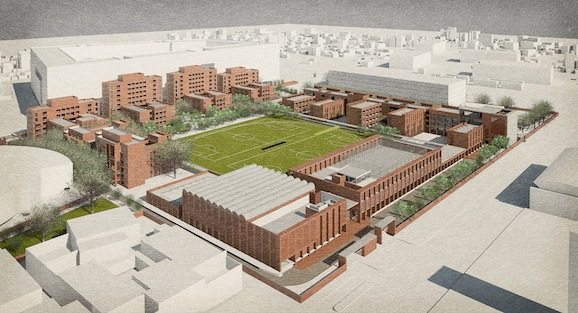
Our Campus
Built on a 17-acre site near Bashundara, Dhaka, the Aga Khan Academy Dhaka offers state-of-the art facilities on a secure, landscaped campus.
The Aga Khan Academy Dhaka is located on a 17-acre plot in Bashundara, Dhaka and will enrol 750 students (K-12) with a capacity to expand to 1,200. Residential facilities will be provided for students and staff to allow for wide participation and enable a diverse learning community. The school has been designed by renowned international architects to ensure the best possible educational experience in a physical environment that resonates with local Bangladeshi culture and architectural traditions.
The design for the Aga Khan Academy Dhaka received the award for best ‘Future Education’ project at the World Architecture Festival 2017, held on 15-17 November in Berlin, Germany. The award recognises the excellence of the school’s design as well as the project’s intention to generate positive social impact, which arises from the mission and values of the Aga Khan Academies and the wider Aga Khan Development Network (AKDN). The vision of the Academies is to develop future leaders with the skills and knowledge to positively support development in their own societies.
Construction of the Academy began in 2018, with the first batch of students being welcomed on campus in August 2022.
The Academy is the fourth in a network of about 18 planned Academies offering the highest international standard of education to students in countries across Africa, South and Central Asia, and the Middle East.
The campus has been specially designed by renowned architects and is purpose-built. Our facilities include the following academic and resource areas:
- subject and age-specific classrooms
- well-equipped science and computer laboratories
- library and resource centres
- rooms for the fine arts, music and dance, including individual practice booths and a music recording area.
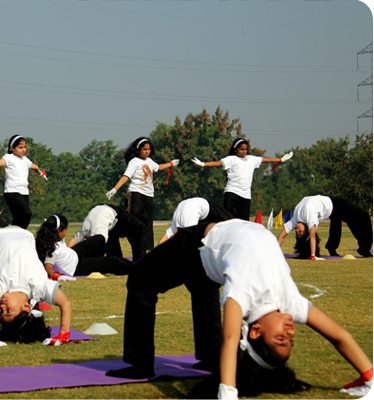 The Commons building will house the dining hall and an array of spaces for school activities. It is designed to be the hub of student activity, serving as the Academy’s main space for major school functions, including music and drama performances, and public lectures.
The Commons building will house the dining hall and an array of spaces for school activities. It is designed to be the hub of student activity, serving as the Academy’s main space for major school functions, including music and drama performances, and public lectures.
Sports facilities
Our sports facilities are extensive and, when complete, will include swimming and diving pools and fields for all sports.
We invite you to visit the Academy to take a tour of our campus.
Fatema Sheikh (Class of 2012): Advocating Educational Equality
Fatema Sheikh carries the lessons she learnt during her time at the Aga Khan Academy Mombasa with her to date.
Fatema joined the Aga Khan Academy Mombasa community in 2009 and graduated in 2012. She is currently pursuing a Bachelor of Science in consumer behaviour and marketing at the University of Reading on a full scholarship – an achievement for which she appreciates the support she received at the Academy through university counselling. She has had a colourful university career so far and hopes to graduate with her degree in the summer of 2015.
In the summer of 2013 after her first year at university, Fatema underwent a three-month internship with Champions Life Academy – an organisation which recruits and trains undergraduate students from universities to raise funds for various charities.
“This internship appealed to me, especially because it was related to my course of study as well as being able to support a worthwhile cause.”
She raised funds for a charity called Action for Blind People.
“This internship strengthened a lot of my skills, such as communication, negotiation and time management as well as improving my people skills tenfold. I am now able to approach and communicate with anybody.”
In addition to the work she did over the summer, Fatema was also heavily involved in various community activities through the university’s RED Award scheme.
Currently, she spends her time as a volunteer working with special needs children. Her desire to get involved with something like this was sparked during her time at the Academy in Mombasa. As part of her creativity, action, service (CAS) component of the Diploma Programme (DP), she spent time working with children in the special support unit of the Junior School, helping them with one-on-one or small group sessions on areas such as reading and comprehension.
“As difficult as it is, it is equally rewarding. When you get the child to enjoy what they are doing and play a part in helping them learn, it is very fulfilling.”
One situation she reflects on is her success in working with a student with several impairments, such as delayed speech, hearing impairment and a slight problem with balance.
“Helping and encouraging her made me feel like I was contributing to her understanding of various concepts," she says. "Working with children is always a two-way thing – they teach you as much as you teach them.”
In the past, she has also been involved in cultivating a garden at a school as well as volunteering at a family church in Reading during Christmas.
Fatema also places great worth on the advice she got from the Academy in preparation for university.
“My experience at the Academy could not have prepared me for life at university any better. While at the Academy, I was immersed in a diverse and multicultural environment which allowed me to adjust relatively easily to university where I was and still am constantly meeting people from different backgrounds.”
Having studied in this environment made her more open-minded and accepting of other people, and that has contributed to her being able to make friends and interact with people more easily. She also reflects on the value the International Baccalaureate (IB) DP added to her education.
“Deciding to do the IB DP is probably one of the smartest decisions I have made. I feel that the work ethic and skills such as time management required to do the programme have prepared me to take on any challenge.”
However, it was not just the academic component of the programme that pushed Fatema to stretch her limits. The DP's CAS component requires students to be actively involved in extra-curricular activities, and the theory of knowledge lessons encourages students to think critically in all disciplines. She commends both these aspects of the programme for instilling values in her that have become intrinsic to the way she lives her life.
“It made me into a more well-rounded and holistic individual,” she says. “It prepares you for life outside of school and makes you think about things that would not cross your mind or that you normally would not consider important. My ability to think and analyse situations critically has improved significantly due to constantly being challenged throughout the programme.”
Fatema has also been able to think about the time she has spent away from home and how her experience at the Academy prepared her for life in a new environment. The abundance of the AKA Mombasa alumni at the University of Reading was a part of that, and she was able to form connections quickly within the community. She also felt that the Academy offered education and opportunities just as good, if not better, than the schools in more developed places such as England, which made it very easy to transition into the unfamiliar environment.
“The Academy and the IB encourages independent thinking and this served me well since it was the first time I was living away from home for a long period and where I would have to make a lot of decisions on my own.”
A lot of Fatema’s involvement in her local community at university is inspired by the ethics she picked up at the Academy. One of the projects of which she is particularly proud is an outreach programme she conducted while interning for the Kenya School Improvement Project (KENSIP) as part of the Aga Khan Foundation internships offered to DP students at the Academy. She visited rural schools and worked with the adolescent girls there towards educating and counselling them on the day-to-day challenges faced. Initially, she focused on identifying the key issues to be tackled and then tried to come up with a way in which sensitive issues such as abuse, early pregnancy and the menstrual cycle could be approached.
“I formed a very close bond with the girls I worked with as well as their teachers. I truly felt like I helped to make a difference and taught them something worthwhile. Although I spent most of my time with the girls, I also included the boys and led forums which discussed issues such as bullying and drug abuse.”
As part of her outreach project, she worked to raise awareness in local rural communities about equal education opportunities for both boys and girls.
Fatema's commitment to providing education opportunities remains strong to this day. In particular, she feels passionate about eradicating gender inequality when it comes to education in rural parts of the world. Her work with KENSIP highlighted the need for equal education for boys and girls as the key to future development.
“It is only through education and knowledge that the current and future generations can flourish. I believe the key to breaking the poverty cycle is improving education opportunities. So, if I had all the resources at my disposal, I would advocate for the importance of the girl child being allowed to attend and stay in school.”
Academy Fellows
Hear what some of our former Academy Fellows have to say about their experience and see them in action
